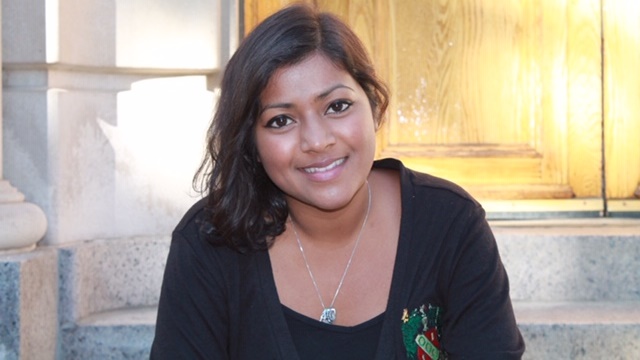Avishta Seeras

Name: Avishta Seeras
Specialty/Program:
Bachelor of Arts Hons. in Spanish & Latin American Studies
If you were a superhero, who would it be?/If you had a super power, what would it be?
I would be Wonder Woman because she is omnilingual which means that she can speak and understand many, if not all languages. She also has superhuman speed and strength, and she is immortal so she has the ability to be a lifelong learner.
What spurred you on to be an Honors student in the department?
I began my MLCS degree program with a major in Spanish and a minor in Latin American Studies. After the first semester, a few of my professors recommended that I join the Honours program because they thought that I would be a good fit for it. I looked into the program requirements and realised that I was already doing the same amount of work. The only difference was that I would have to write a longer research paper at the end of my degree, that is, the thesis. I thought that working closely with one of my professors (my thesis supervisor) would be a great opportunity and good practice for me, as I would like to pursue a Masters after graduation. I was also excited about the opportunity of exploring a topic within languages and cultural studies that I was truly interested in, like migration studies, which is not offered by the department.
What is the best thing about being an Honors student in the department of MLCS?
I would say that you constantly push yourself to work harder throughout your whole degree because you know that first of all, it's important to maintain a high GPA and secondly, you get to interact with fellow Honours students who have the same drive and interests as you. This is especially important because I found that Honours students tend to engage in academic discussions outside of the classroom more often than other students, so we constantly share ideas about our research, our assignments and our academic goals, etc..
Cause(s) you care about
I'm particularly interested in the topic of migration and I have volunteered with Migrante Alberta (advocating for migrant workers) and the Edmonton Immigrant Services Association (translating legal documents) to help newcomers integrate better in the Edmonton community. I'm also interested in promoting cultural understanding in the workplace and community by debunking negative stereotypes about different cultures, especially Latin American ones. I have travelled to Colombia every summer since 2015 to teach English to underprivileged students.
Tell us about a topic you are excited to do research about (e.g., your current Honors thesis)
My research for my Honours thesis is focused on the Venezuelan migrant crisis in Colombia. I am doing an analysis of Facebook posts (people's narratives) to determine the different emotions or feelings that are being showcased by both Venezuelans and Colombians in relation to the migrant crisis. I am using that data to explain how social media is contributing to the Colombian's perception of Venezuelan people and how that is shaping the Venezuelan identity in Colombia.
Any (survival) tip(s) you would like to share with fresh MLCS Honors students?
Try to make friends with fellow Honours students as they will be a good support throughout your degree, especially when you start writing your thesis paper. As an Honours student, you are given an office to use but you should really study in a space where you think that you can be most productive in. In my case, I never used the MLCS Honours students' office. If you have the opportunity to present any of your research or papers at a conference, whether it's Arts Con or the MLCS Honours Conference, do it! It's a great opportunity to expose your work to a larger audience.
The first thing you plan do after graduating.
If I didn't have loans to worry about, I would have said, travel back to Latin America and keep teaching English while practicing my Spanish but I have to delay this plan for now. I will be working in the immigration sector after graduation and in September, I will be participating in the North American Language and Culture Assistant program in Spain, where I will be teaching English to primary or secondary school students.